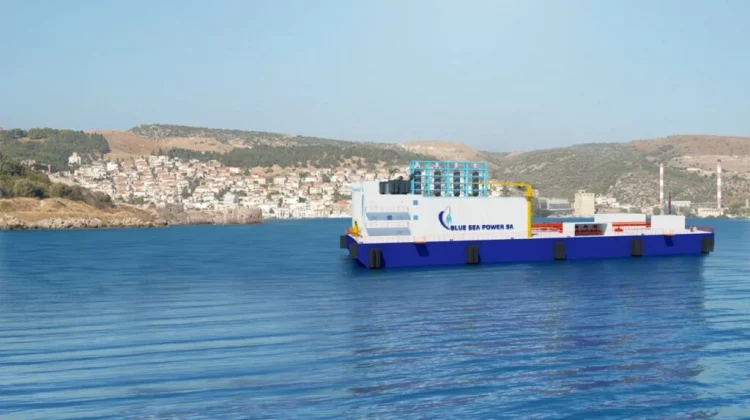
London-based design and engineering consultancy Houlder is collaborating with Blue Sea Power, an integrated energy solution provider as a gas-to-power company based in Athens, to develop innovative floating liquid-natural-gas-to-power barges to provide greener power to three Greek islands, aiming to have them operational by 2025.
According to the two companies, the barges will efficiently provide greener, lower emission baseload and peak power to the non-interconnected islands of Kos, Chios and Lesvos. The plan is to use the power when the existing renewable solar and wind energy systems reach their technical limits. The barges will replace the existing diesel and heavy fuel oil power generation infrastructure, which is outdated and inefficient, while complying with regulations set out in EU and Greek climate legislation.
In the current phase, Houlder will design the barge to a level that will achieve approval in principle by the class society, Lloyd’s Register, and will support Blue Sea Power in creating the design package required for securing suitable tenders from shipyards for eventual construction.
Houlder has already completed the key decision studies on the main power generation engine selection, a cargo containment system, design standardisation, options for greenhouse gas reduction and efficiency strategies, and capital expenditure. It has also carried out an environmental study that looked at elements such as the impact on seawater temperature and noise pollution.
Houlder says that it will incorporate innovative, specialist solutions to meet and even exceed EU Taxonomy regulations on greenhouse gas emissions for new power plants in Greece, which limit emissions to 270 grams of carbon dioxide per kilowatt hour or a 20-year average of 550 kgCO2/kWh.
EU funding will cover a substantial part of the capital expenditure for the project as it qualifies for its Reconciliation Recovery Fund. And because the projects are environmental, social and governance compliant, the team has secured green financing from multiple banks and investors.
Although the project will make use of proven technologies, specific innovations will also be included in order to improve efficiency, include maximising the recovery of waste heat from the exhaust and using waste heat recovered from the engine’s cooling water system to generate fresh water for export. The barges will also maximise the recovery of cold energy from the evaporation of liquid natural gas and use variable-frequency drives to improve the efficiency of the onboard motors.
The team expects to incorporate an onboard cryogenic carbon capture system. The engines will run on a hydrogen production blend, ready to further improve sustainability as the technology to enable this matures. There will also be scope to factor and blend bio-LNG and renewable synthetic e-LNG into the supply chain to further reduce emissions.
According to the partners, there’s potential to develop several more barges and even scale up the projects to efficiently provide other Greek islands and EU locations with green energy.
‘Floating LNG power barges are greener than traditional power generation infrastructure and, with novel integrated design and engineering developments, we can make energy production even more efficient and sustainable,’ said Jonathan Strachan, Houlder’s ship design and engineering director.
‘We have obtained electricity production licenses from the regulator for Kos, Chios and Lesvos and we have developed a strong approach to provide all three islands with greener, lower-emission power, said Konstantinos Mitropoulos, founding partner of Blue Sea Power. ‘Houlder has been an invaluable partner. The team has leading technical expertise in sustainability-centric design and engineering and has worked in a practical approach, which has also complemented the Blue Sea Power project delivery expertise.’
‘While floating liquid-natural-gas-to-power integrated power barge is a solution that may appear novel in its approach, it utilises proven tried-and-tested equipment to reduce associated design and construction risks,’ said Mark Graham, Blue Sea Power’s director of projects. ‘This near-shore solution, along with its modular design and shipyard construction, also presents many repeatability benefit opportunities on CAPEX, OPEX and construction schedule savings.’


